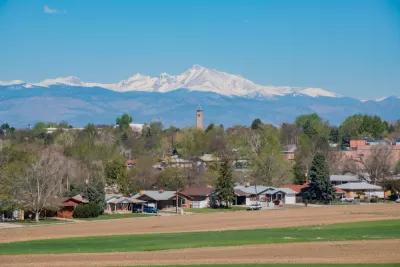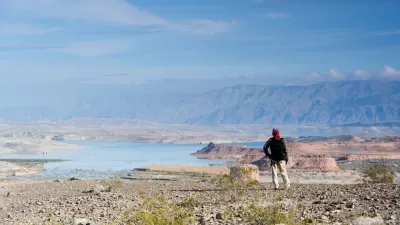The city of Westminster, Colorado has grown from 10,000 in 1962 to 113,000 in the present day, ensuring water supply for the growing population by considering water efficiency in every zoning decision.

Jason Plautz reports on the sustainable development planning practices of the city of Westminster, Colorado, which weathered the controversies of a drought during the summer of 1962 (a sprinkler ban and poor tap water quality inspired a "Mothers' March" and attracted national news coverage) to become a regional leader in water demand management.
In the years that followed the drought, Westminster settled its supply issues, but "continued to focus on taming demand, most recently with a conservation and planning approach that’s become a regional model for managing growth without straining resources."
The key to this approach is a novel approach to land use planning that relies on water data to inform sustainable decision making.
That meant city planners could identify where it might make more sense to zone for multifamily housing, or see where new pipes might be necessary. Developers could amend their permits to include more low-flow toilets or water recycling. On rare occasions, proposals have been scrapped because they’d need more water than the city could supply. Essentially, Westminster is planning for the worst, making sure that another drought won’t force anyone to turn off the taps.
Stu Feinglas, Westminster’s recently retired senior water-resources analyst, serves as a source for soundbites and explanations of the Westminster water-focused planning approach throughout the article.
FULL STORY: The Town That Extended ‘Smart Growth’ to Its Water

Alabama: Trump Terminates Settlements for Black Communities Harmed By Raw Sewage
Trump deemed the landmark civil rights agreement “illegal DEI and environmental justice policy.”

Study: Maui’s Plan to Convert Vacation Rentals to Long-Term Housing Could Cause Nearly $1 Billion Economic Loss
The plan would reduce visitor accommodation by 25% resulting in 1,900 jobs lost.

Planetizen Federal Action Tracker
A weekly monitor of how Trump’s orders and actions are impacting planners and planning in America.

Wind Energy on the Rise Despite Federal Policy Reversal
The Trump administration is revoking federal support for renewable energy, but demand for new projects continues unabated.

Passengers Flock to Caltrain After Electrification
The new electric trains are running faster and more reliably, leading to strong ridership growth on the Bay Area rail system.

Texas Churches Rally Behind ‘Yes in God’s Back Yard’ Legislation
Religious leaders want the state to reduce zoning regulations to streamline leasing church-owned land to housing developers.
Urban Design for Planners 1: Software Tools
This six-course series explores essential urban design concepts using open source software and equips planners with the tools they need to participate fully in the urban design process.
Planning for Universal Design
Learn the tools for implementing Universal Design in planning regulations.
Caltrans
Smith Gee Studio
Institute for Housing and Urban Development Studies (IHS)
City of Grandview
Harvard GSD Executive Education
Toledo-Lucas County Plan Commissions
Salt Lake City
NYU Wagner Graduate School of Public Service





























